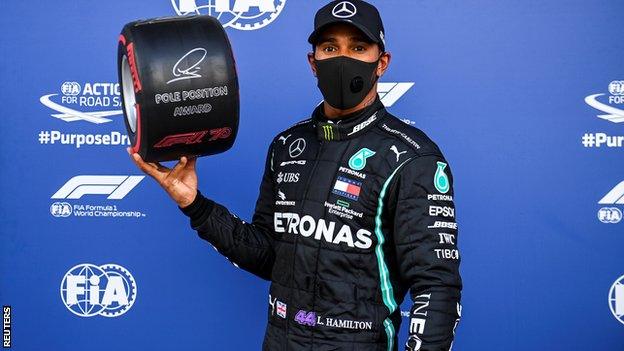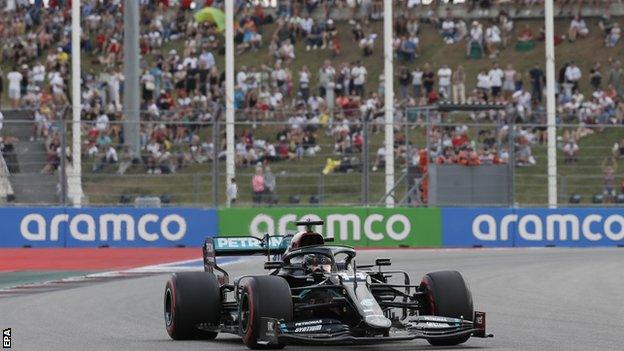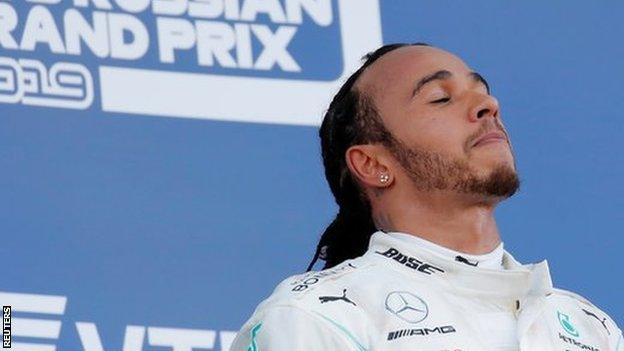Russian Grand Prix: 'Lewis Hamilton has job on to equal Michael Schumacher's record'
- Published

The Russian Grand Prix is on BBC Radio 5 Live Sports Extra from 12:00 BST
Lewis Hamilton starts the race in which he could equal the all-time record for grand prix victories from pole position on Sunday - but that 91st win is very far from the near certainty it might be in other circumstances.
After a dramatic qualifying session at the Russian Grand Prix, in which the Mercedes driver nearly ended up 15th after a combination of mistakes and bad luck, Hamilton has two major concerns going into the race - the tyres he is on, and the fact pole might be more of a handicap than an advantage.
First, track position. Pole gives Hamilton a seven-metre advantage over Max Verstappen's Red Bull in second place. But the run from the grid down to the first corner at Sochi is the longest on the calendar and the slipstream effect is huge.
In 2017, Hamilton's team-mate Valtteri Bottas used this from his third place on the grid to tow past the two Ferraris in front of him and into a lead he was never to lose on the way to his maiden victory.
Last year, when Ferrari's Charles Leclerc was on pole, ahead of Hamilton, Ferrari used team tactics to ensure Leclerc allowed his team-mate - Sebastian Vettel, who started third - to tow past him into the lead, so they ran one and two ahead of Hamilton. That led to a big falling out at Ferrari, but that's another story.
Inevitably, then, Hamilton is worried about being passed down the straight after the start by at least one of Verstappen and Bottas, who is third on the grid.
"It's not a good place to start at all," he said. "And this year our cars are more draggy and there is more tow than we have seen in other years. I genuinely expect one of these two to come flying by at some point."
Hamilton has some defence against this because he is starting on the soft tyres, which give the best grip off the line, while Verstappen and Bottas have the mediums.
Whether that is enough to offset the effect of the tow remains to be seen, but even if it is, Hamilton's problems will be far from over, because the soft tyre is very much not the best on which to start the race. It wears too quickly.
Even if he maintains the lead at the start, Hamilton will have to fend off Bottas and Verstappen as long as he can - not easy with such a long straight.
"I am on the worst tyre," Hamilton said. "It is a good tyre to do an actual start, but it has the biggest degradation - 10 times more than any other tyre, I think it is - so that's going to be a struggle.
"I don't know if that puts me on to a two-stop [strategy]. Unlikely, because the pit lane is too slow so I am just going to have to nurse those tyres as far as I can."
If he can hang on, and Mercedes' strategists can find a window of clear air into which he can exit after his pit stop, he might still be OK. But the team do not sound that optimistic.
Mercedes team boss Toto Wolff said: "It is not the optimum strategy because after some laps the soft is clearly going to suffer and that means it compromises your whole race because you probably need to pit into traffic and that is not a great situation.
"But Lewis is the best overtaker in the field and I hope he can make his way back because he was the quickest driver on track today."
How did Hamilton get in this position?

Hamilton described the session as "one of the worst qualifyings - it was horrible, heart in mouth the whole way"
The quickest driver Hamilton certainly was - he took pole by more than 0.5 seconds and Bottas was 0.652secs adrift, and admitted he did not know why. But the session was anything but smooth sailing for Hamilton. In fact, there were dramas from the off.
In the first knockout session, Hamilton ran wide on his first lap at Turn Two - the de facto first corner - and failed to comply with guidelines about how to rejoin the track.
That meant he had to do a second lap to make it into the next session - and led to a stewards' inquiry, though no further action was taken.
Then, in the second session, which defines the start tyres, Hamilton went out on the favoured mediums and set a blistering first lap, 0.4secs quicker than Bottas. However, that time was deleted because he had run too wide out of the last corner and exceeded track limits.
He wanted to do another lap straight away and had an argument with the team when they called him in to the pits instead. Wolff said they had no choice - he did not have enough fuel in the car to stay out.
There was still plenty of time for another lap on the medium tyres at the end of the session, and Hamilton was about three corners from the end of one that would have put him fastest when Vettel crashed at Turn Four and brought out the red flag.
Now, there was jeopardy.
There were only two minutes 15 seconds left in the session. In theory, there was still time to do an out lap and start a flying lap before the chequered flag ended the session, but now Hamilton had another problem.
Time was tight, so there was going to be a rush to get out. Other cars lined up at the end of the pit lane and waited in a queue, with their engines switched off. Hamilton could not do that because the Mercedes engine cannot be restarted by the driver using electrical energy from the hybrid system, whereas those of the other three manufacturers can.
So Mercedes sent him out only when they knew there was sufficiently little time left before the restart for him to sit in a queue with the engine idling without damaging it.
But that still meant waiting a couple of minutes - and that meant the engineers insisted he switched to the soft tyres. Hamilton wanted the mediums again, but they overruled him because they were concerned the harder mediums would lose too much heat while he waited in the queue and that he would never be able to warm them up again.
Even on the softs, he still nearly lost it at the first corner before gathering it up again after driving through the run-off area. The out lap that followed was a tense one.
Knowing he was tight on time, Hamilton asked halfway around it how he was doing for time and was told he was 20 seconds behind schedule.
He picked up the pace and forced his way past Racing Point's Sergio Perez and McLaren's Carlos Sainz before the last two corners. He was then blocked by a Renault into the final turn.
As Hamilton backed off to give himself some space, engineer Peter Bonnington came over the radio, his voice urgent: "Need to go, need to go, need to go." Hamilton floored it and crossed the line with a second to spare.
Can he do it?

The omens look good as Hamilton has won four out of the six races held in Sochi since 2014
Hamilton spent the eight-minute break between the sessions clearing his mind of the stress and composing himself again.
"Just having to calm myself down and find my centre, you know, calm my heart down and wanting to deliver in Q3," he said.
"I was adamant. I had no choice. I had to deliver on those two laps. Valtteri had been doing great all weekend. Nothing new in that respect, but I knew I needed to have a perfect lap, particularly on the first run, to get the pole.
"Obviously pole position is not great here; it never has been. Still, going for pole is what we do.
"The first lap was really great. I thought it was going to be very difficult to improve on it, but I think I managed to improve just a tiny bit, I think, on the second lap.
"I'm super grateful to everyone for just about keeping their cool. And it could be a lot, lot worse. I could be out of the top 10, so I'm really grateful I got to compete."
Having dragged himself out of a hole partly of his own making on Saturday, Hamilton now somehow has to find a way to do it again in the race.
"I am just going to focus on my race and try to run the fastest race I can," Hamilton said.
"If these guys get by they are going to be pulling away, so I am going to sit down and work out if there is a different kind of race I can do to keep my position."
The record he will not be bothered about, not of itself anyway. As he has so often said, he is not one for numbers, and as he pointed out on Thursday: "It will happen at some stage. I'm not quitting any time soon."
But he still wants the win, for the sake of it - because that's why he's there and because it would be another giant step on the way to equalling another Schumacher record: seven World Championships.

Cancel Culture: Has it gone too far?
Video Games: The industries problem with inclusion
